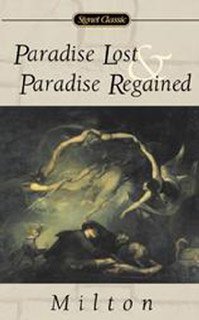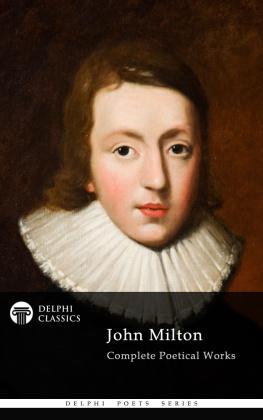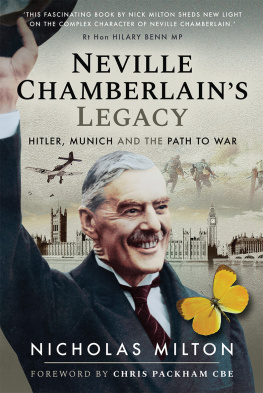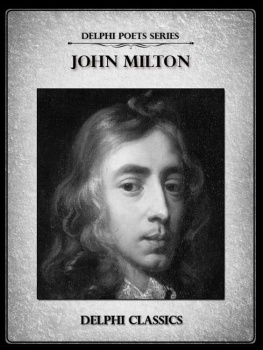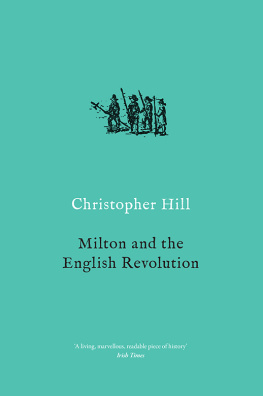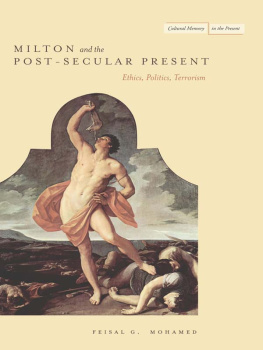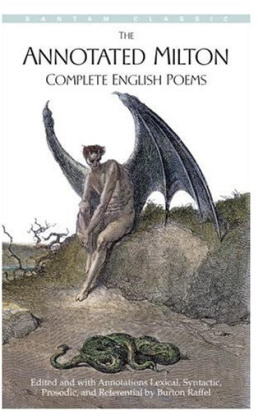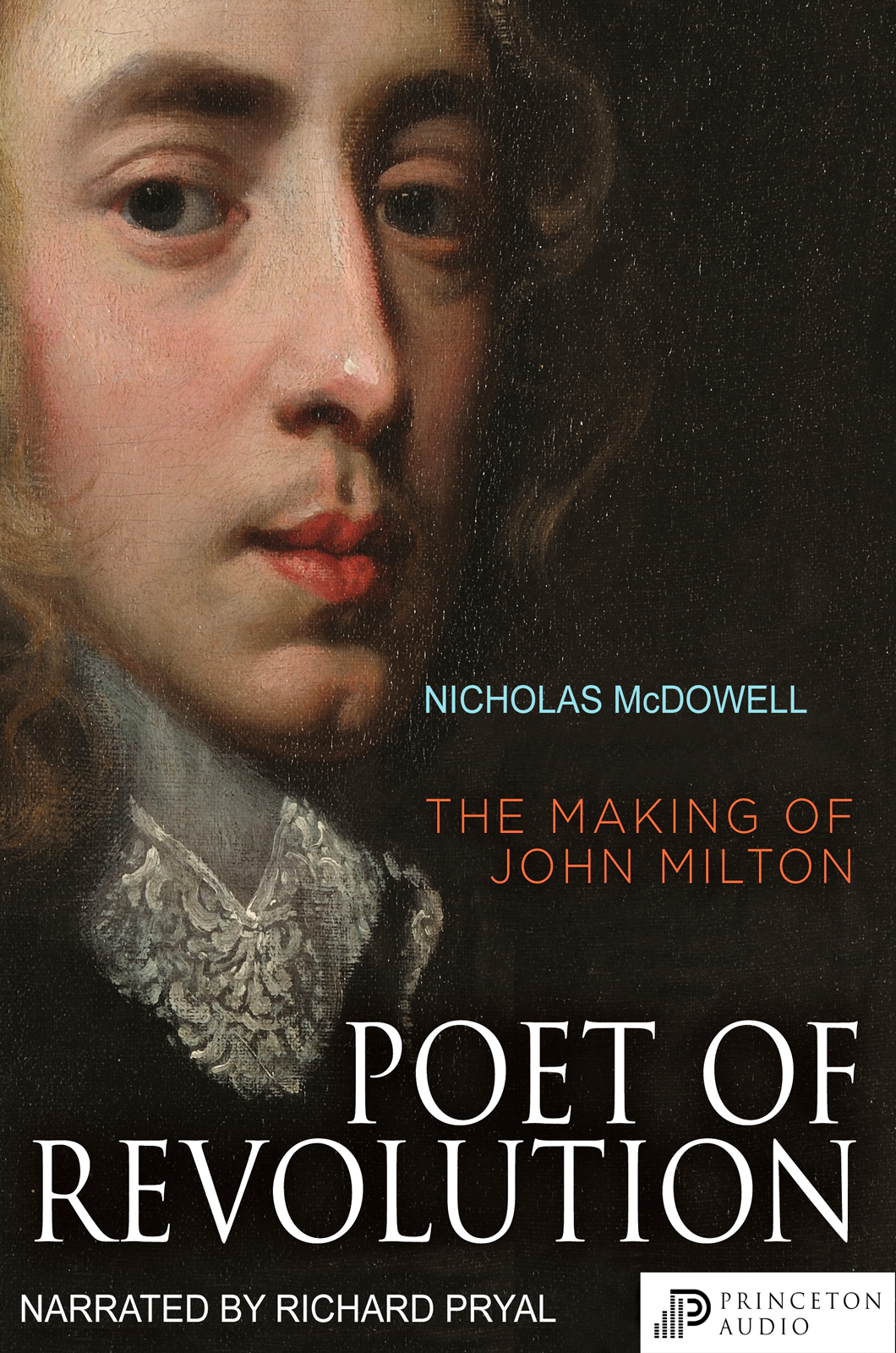POET OF
REVOLUTION
THE MAKING OF
JOHN MILTON

NICHOLAS McDOWELL
PRINCETON UNIVERSITY PRESS
PRINCETON & OXFORD
Copyright (c) 2020 Princeton University Press
Requests for permission to reproduce material from this work should be sent to
Published by Princeton University Press
41 William Street, Princeton, New Jersey 08540
6 Oxford Street, Woodstock, Oxfordshire OX20 1TR
press.princeton.edu
All Rights Reserved
ISBN 9780691154695
ISBN (e-book) 978209128
ISBN (e-book) 9780691215341
Version 1.0
Library of Congress Control Number: 2020941718
British Library Cataloging-in-Publication Data is available
Editorial: Ben Tate and Josh Drake
Production Editorial: Debbie Tegarden
Text Design: Leslie Flis
Jacket/Cover Design: Lorraine Doneker
Production: Danielle Amatucci
Publicity: Katie Lewis and Alyssa Sanford
Copyeditor: Tash Siddiqui
Jacket/Cover Credit: Portrait of a young man identified as John Milton in the collection of Christs College, Cambridge, attributed to Peter Lely or Mary Beale. By kind permission of the Master and Fellows of Christs College, Cambridge.
... the childhood shews the man,
As morning shews the day. Be famous then
By wisdom[.]
JOHN MILTON, PARADISE REGAINED (1671)
In reading [Miltons] works, we feel ourselves under the influence of a mighty intellect, that the nearer it approaches to others, becomes more distinct from them. The quantity of art in him shows the strength of his genius: the weight of his intellectual obligations would have oppressed any other writer.
WILLIAM HAZLITT, ON SHAKESPEARE
AND MILTON (1818)
Let us never forget Milton, the first defender of regicide.
FREDERICK ENGELS, THE NORTHERN STAR
(18 DECEMBER 1847)
One of the typical features of Dantes personality, which qualifies him as an intellectual in the modern sense of the word, is his endless reflection on what he is doing, both as an author and as a man.
MARCO SANTAGATA, DANTE: THE STORY
OF HIS LIFE (2016)
CONTENTS

xi
xiii
xv
PART I:
LONDON AND ST PAULS SCHOOL, 160825
PART II:
CAMBRIDGE AND CHRISTS COLLEGE, 16259
PART III:
CAMBRIDGE AND HAMMERSMITH, 162935
PART IV:
HORTON AND ITALY, 16359
PART V:
LONDON AND ALDERSGATE STREET, 163942
LIST OF ILLUSTRATIONS

ACKNOWLEDGEMENTS

This book took (considerably) longer than it was supposed to take, and my primary thanks are to my editors at Princeton University Press for their patience: first Al Bertrand, who commissioned the book, and then Ben Tate, who waited for it. Thanks also to others who worked on the book in production, in particular Debbie Tegarden and Tash Siddiqui. The books intellectual origins lie in the invitation of Paul Stevens to speak at the Canada Milton Seminar at the University of Toronto in 2010, which was a key moment in developing my thinking about the young Milton. More recently I am grateful to Rachael Hammersley for asking me to contribute to an Intellectual Biographies Workshop at Newcastle University in 2017, which enabled me to discuss methodological issues along with others working on biographical studies of early modern figures; and to Sarah Mortimer, whose invitation to speak at the Religion in the British Isles, 14001770 seminar at Oxford in the same year presented my arguments to salutary interdisciplinary interrogation. For particular suggestions or bits of help over the years, even though they might have forgotten they ever gave them, I thank Sharon Achinstein, Niall Allsopp, Claire Bourne, Hannah Crawforth, Karen Edwards, Tobias Gregory, Zoe Hawkins, Ariel Hessayon, Edward Jones, Tom Keymer, Sarah Knight, Colin Lahive, Rhodri Lewis, Jason McElligott, Jeff Miller, Joe Moshenska, Henry Power, Jason Scott-Warren, George Southcombe, and Blair Worden. I may not agree with all the conclusions of Gordon Campbell and Tom Corns in their 2008 biography but it is a major work of scholarship that has shaped my own arguments, and they have both always been generous to me and engaged with my arguments in the open-minded spirit in which they are intended.
I owe much of my continued enthusiasm for Milton to discussion and debate with several generations of lively undergraduates at the University of Exeter and also with recent doctoral students, including Anthony Bromley, Philippa Earle, Tessa Parslow, and, in particular, Esther van Raamsdonk, who got me thinking about Milton and European culture in different ways. The three readers for Princeton University Press, who revealed themselves to be William Poole, David Quint, and Paul Stevens, provided wise and scrupulous reports; David Quint subsequently directed me towards some important further reading. I have convivially discussed these matters for many years now with Will Poole, whose own scholarship on Milton and others sets the highest bar. This book would almost certainly not exist had I not had the good fortune to be introduced to Miltons prose by Nigel Smith over the course of my first term as a Masters student twenty-five years ago, which transformed the Milton I thought I knew from undergraduate study. My parents have picked up several volumes on Milton from second-hand bookshops for me over the years, and they all came in useful in some way. Finally, I must acknowledge the support and optimism of Sally Faulkner as well as the tolerance of our sons, Rowan and Cameron, for all the times I told them I was working on my book.
St. Leonards, Exeter
December 2019
NOTE ON TEXTS AND ABBREVIATIONS

In the notes the place of publication is London unless otherwise stated. All references to Miltons shorter poems, and to their translations, are to the Oxford Complete Works of John Milton. Volume III: The Shorter Poems, ed. Barbara Kiefer Lewalski and Estelle Haan (Oxford, 2012; corrected impression, 2014), unless otherwise stated, and are incorporated into the text by line numbers. All references to Paradise Lost are to the 1674 edition and are incorporated into the text by book and line numbers; all references to Paradise Regained and Samson Agonistes are to the Oxford Complete Works of John Milton. Volume II, ed. Laura Lunger Knoppers (Oxford, 2008), and are incorporated by book and line numbers. All references to Miltons printed prose works are to the first editions unless otherwise stated; references to translations of printed prose and to editions of manuscript writings are specified in the notes.
Abbreviations
Campbell, Milton Chronology | Gordon Campbell, A Milton Chronology (Basingstoke, 1997) |
Campbell and Corns, John Milton | Gordon Campbell and Thomas N. Corns, John Milton: Life, Work, and Thought (Oxford, 2008) |
CELM | Catalogue of English Literary Manuscripts, 14501700 |


